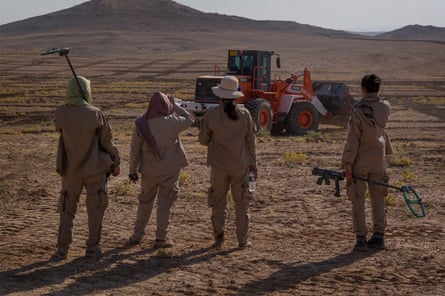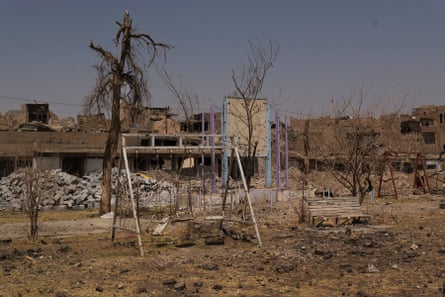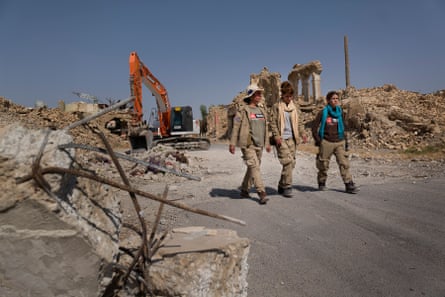Isis planted mines across Sinjar and displaced the Yazidi community. Now a group of women are clearing the way for the return of their people
Behind Hana Khider is a large grey wall map, with the minefields her team have been clearing marked in green. “This is the place where Yazidis lived together,” she says. “It’s where I lived in my childhood; I have so many memories here, it’s very important to me.”
The place is Sinjar, or Shingal as Yazidis know it, on Iraq’s north-western border with Syria. Khider, 28, is speaking via video call from her office in the region.
“This job is so important to me because I feel like I’m doing something good for my family, my community and the people who were displaced from Sinjar. By removing the mines, I’m helping them to maybe one day come back.”
In August 2014, Isis invaded and occupied this region. The group murdered about 5,000 Yazidis, kidnapped and enslaved 6,000 women and children and displaced a community that had been living in towns and villages nestled around Sinjar mountain, sacred to Yazidis, for centuries.
“Before we had a normal life. Everything was good, people were living their life happily. But after the genocide in 2014, everything changed. We’re no longer secure,” Khider says.
By the time Isis was pushed out of Sinjar in 2017, it had planted hundreds of thousands of landmines and other explosive devices in homes, buildings and fields. The group manufactured them on an industrial scale, but also used household items including pots, pans and even video game controllers – whatever it could get its hands on – to build improvised devices.
“People are killed or injured on a daily basis south of the mountain,” Khider explains. An important part of her work is educating the community and children in particular, who are at greatest risk. In one area, a man told her an explosion had killed his 15-year-old nephew as he was out in the fields looking after a herd. His other nephew sustained life-altering injuries.
A new film, Into the Fire, follows Khider and her team of Yazidi women at Mines Advisory Group (MAG), an international charity which removes unexploded bombs in former war zones across the world, as they clear Sinjar.

The high level of mine contamination is one reason why, three years on from Sinjar’s liberation from Isis, only about a quarter of the population have returned.
Almost 300,000 Yazidi people still live in tented camps and makeshift shelters in the nearby Kurdistan Region of Iraq. Conditions are poor and the community has inadequate access to services, including treatment for high rates of mental illness. Over 2,000 women and children are still missing.
Those who have gone back are living mainly north of the mountain that divides Sinjar, according to Portia Stratton, Iraq country director for MAG.
MAG has extraordinary teams of female de-miners who totally challenge stereotypical perceptions of ‘woman’s work’
Orlando von Einsiedel, director
“The north of the mountain, although badly affected, was less contaminated than the south, as Isis held it for a much shorter period. Also with populations moving back more to the north, we have historically had more information about the contamination in those areas.
“In the south, especially, a lot of work remains to be done,” she says.
The charity cleared Khider’s village in 2016, enabling her and her family to move back, although not to their old house. It had sustained too much damage for that.
A high proportion of homes across the district have been similarly affected, with many completely destroyed. Shrines, schools and public buildings lie in ruins.
“There’s also a lack of services, like medical care and education, especially in the villages,” Khider says. Two of her children are in school, but they have to walk miles everyday through war damage to attend. “What I want more than anything is for them to be safe and free.”
Despite the dangers of her work, Khider never gets scared. “I have confidence in myself and I know that I’m doing the right thing.”
Part of the problem is that Sinjar falls within Iraq’s “disputed territories”, areas claimed by both the Iraqi central government and the Kurdistan regional government.
Political tussling has fuelled conflict, fragmented authority and left Yazidis and other minorities, including Assyrians, Turkmen and Shabaks, in Sinjar and the nearby Nineveh Plains, particularly vulnerable.

There is “a lack of functioning government”, according to Abid Shamdeen, the executive director of Nadia’s Initiative, a charity working in Sinjar set up by Nobel peace prize laureate Nadia Murad.
A lack of official law enforcement in the region also “engenders both chaos and fear”, he says.
A multitude of militias with competing affiliations operate in the area, preventing former residents from returning and hindering reconstruction. This insecurity was highlighted in mid-June by the latest in a series of Turkish air strikes on Sinjar Mountain targeting Kurdish militants, but hitting areas in close proximity to civilians.
“When will @IraqiGovt & the international community apply some courage & political will to resolving security challenges in Sinjar?” tweeted Murad in response.
Despite this precariousness, Khider is committed to the home that she loves. She has now started a new garden.
They’re doing something good for their community and family, and they can depend on themselves, financially and in other ways
Hana Khider
“I’ve planted simple things, some flowers, vegetables like cucumbers, tomatoes, aubergines,” she says. “I feel like they all have a soul and spirit. I feel happy just watching them.”
It is this attitude that attracted Orlando von Einsiedel, the Oscar-winning director of The White Helmets, to Khider’s story.
“Into the Fire doesn’t focus on the darkness of Isis and its actions. I wanted it instead to focus on the incredible resilience and fortitude of those who survived their atrocities and who are rebuilding their lives and their communities.”
He also hopes that the film will bring greater awareness of the role women play in rebuilding their communities after conflict. “Across the world, MAG has extraordinary teams of female deminers – many of them mothers – who totally challenge stereotypical perceptions of what is ‘woman’s work’.”

Khider thinks this work is one way the women on her team, some of whom are former Isis captives and all of whom lost family and friends in 2014, can recover.
“They’re doing this job that previously maybe only men were doing, and it gives them confidence in themselves. They’re doing something good for their community and their family, and they can also depend on themselves, financially and in other ways.”
Khider still works with all the women, but has since been promoted to lead a larger team that includes men. Since 2016 she and her colleagues have cleared more than 27,000 mines from areas liberated from Isis.
When she first saw Into the Fire, she says: “I felt sad seeing the reality that we are living in now and all the things that happened to my community and Yazidi people. But I also felt happy to see the good things that my team and I are doing.
“I hope the film shows people around the world that we Yazidi women are strong, we don’t give up and that we are able to stand up again and live our life, even after everything that we have been through.”

